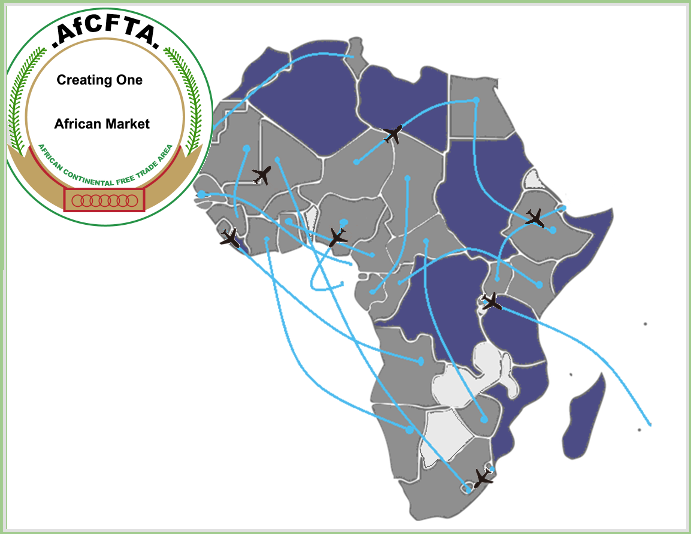The AfCFTA or African Free Trade Area Agreement was a project that was envisaged over four decades ago with the esposal of the Monrovia Strategy of 1979, the Lagos Plan of Action of 1980, and the Abuja Treaty of 1991.
Right from the start, the objective of the African Free Trade Area Agreement was to generate plenty of opportunities in terms of business and investment which would eventually result in more employment in the African nations thereby fostering market enlargement and making the continent the largest free trade area in the world. On 1st January 2021, 54 African countries have entered into an agreement thus giving the vision of AfCFTA a concrete shape.
The idea behind the creation of AfCFTA is to link 55 African nations with over 1.3 billion people so as to form a comprehensive continental market for products, services, capital, and persons. Apart from these objectives, the agreement also emphasizes on boosting long-term and inclusive growth, commercial diversification, local value growth, infrastructural development, agricultural development, gender equality, and enhanced food security all over Africa.
The pact has heralded an economic game-changer for Africa’s development mainly due to its emphasis on intra-continental commerce and the several opportunities that it will provide to the African countries to slowly merge with the global economy. It will also help to enhance the job opportunities in the continent and result in the reduction and eventual elimination of poverty. The transition of Africa into a free trade area will also reduce tariff barriers and reduce the global trading costs by 14.3%. As a result of this agreement, the business volume in Africa is expected to elevate by 82% in the next 15 years while the total volume of exports will rise by 29%.

AfCFTA and its impact on independent freight forwarders
The establishment of a single market in Africa will in due course eliminate all the obstacles within the continent such as complex customs clearance processes, challenges at the frontiers, and many other administrative issues that hinder cross-border trading. As explained by Philomena Apiko, Sean Woolfrey, and Bruce Byiers, in their book The promise of the African Continental Free Trade Area (AfCFTA), this contract will require all the participating members to wipe out 90% of duties and in so doing will make way for duty-free access to goods and services throughout Africa. It would also help to enhance the demand for a robust transportation infrastructure within Africa.
Air, maritime and road freight forwarding industry will keep playing an important role but the focus is being expected to shift towards rail freight because of its cheap cost of operation. Many African countries like Nigeria is in need of a solid railway network to supplement ocean, air and road for the movement of cargoes.
It goes without saying that new trade routes are going to spring up across the continent giving rise to a need for warehouse operators and professional freight forwarders specializing in project cargo, cold chain logistics etc. This will also entail a growth in the volume of exports, a more competitive market and an enhancement of sales processes and marketing and an overall economic growth that will soon be translated into faster and less expensive shipping and improved connections between the domestic and international seaports.
Implications in the digital innovations
The AfCFTA will also reinforce the process of digital innovation even though the agreement doesn’t directly mention any concerns in the technological field. The Phase 3 of AfCFTA clearly enumerates that the area of e-commerce will be given priority. E-commerce will gradually pave the path for a digital economy in the continent that will provide enough opportunities for greater efficiency, entrepreneurship, digitization and the creation of new markets and jobs.
Nevertheless, still some scepticism exists regarding the dependability of existing infrastructure and the use of virtual systems. New policies need to be created for addressing the problem of inadequate ICT connectivity which can be a deterrent to efficient online competition. We need to remember that Africa still doesn’t have much internet penetration with only 22.6% of the female population having knowledge and access to internet.
Despite all the existing challenges, it is being said that the e-commerce in Africa is going to strengthen in the coming years. The Digital Transformation Strategy launched by the African Union seeks to utilize the available technologies for the advancement of inclusive economic growth in the African societies. The digital transformation will also have a considerable influence on the relation of Africa with the countries of the European Union. For example, the EU’s “Comprehensive Strategy with Africa” highlights an alliance for technological change and recognizes that digitized economy and e-commerce have the potential to advance the financial output throughout all sectors. For several businesses in the supply chain and freight forwarding sector, the AfCFTA will prove a great opportunity for diversification by accessing the African market.

